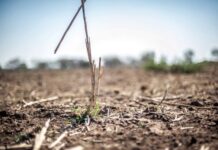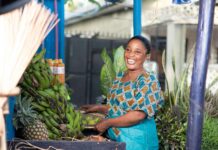By Ms. Alice Ruhweza and Mr. Joost Guijt
Africa’s food systems face a critical juncture. The path forward is becoming clearer with the launch of the African Union’s Strategy and Plan of Action for the Comprehensive Africa Agriculture Development Programme (CAADP). CAADP is the vehicle chosen to drive the implementation of the Kampala Declaration, adopted in January 2025 and set to begin in January 2026. The Kampala Declaration sets lofty goals for transforming Africa’s diverse agri-food systems between 2026 and 2035, following the Malabo Declaration which concludes in December 2025.
Despite the goals of the Malabo decade, many countries achieved less-than-desired progress. Between 2015 and 2021, Africa’s economy grew by an average of 3-4% annually, but GDP per capita increased more modestly as population growth outpaced income growth. This, combined with headwinds like climate shocks, pandemics, and global disruptions, exacerbated structural weaknesses in food systems. The result is grim: more than 20% of Africa’s population – 257 million people – suffer from food insecurity, with severe hunger problems and crisis levels in regions like the Sahel and Horn of Africa. These deeply complex challenges underscore the urgent need for dynamic food systems leaders.
To improve agri-food policies in today’s complex world and overcome these challenges, Africa must marshal a critical mass of African leaders at all levels. The task ahead requires strengthening collaborative leadership and implementation networks across Africa’s agri-food systems. The opportunity lies in CAADP and all partners supporting the Kampala Declaration to embrace and promote investment in the people who can make positive change happen.
Africa needs to produce a new generation of ‘doer’ leaders spanning the private, public, and civic sectors, capable of navigating complex food systems. These leaders are not born; they are intentionally nurtured. With public budgets and international aid resources under pressure, the most resource-effective choice is to invest in Africa’s human capabilities and networks that can drive the transformation envisioned. Men and women across Africa are already taking risks and innovating. With the right mindset and support networks, they can create transformative change.
Consider Kelvin Odoobo, CEO of Shambapro. His Rwanda-based agtech startup helps small farm businesses access finance, quality inputs, and reliable markets. Kelvin enhanced his impact through his experience with the African Food Fellowship (AFF) and the AGRA-led Center for African Leaders in Agriculture (CALA). He now integrates a learning tool into the Shambapro App, equipping farmers with essential knowledge in climate-smart agriculture, practical agroecology, and regenerative farming practices. Learning the importance of connecting people through AFF and CALA, Shambapro has evolved beyond its original purpose, facilitating connections between stakeholders across the agricultural value chain via the Shambapro Hub. Kelvin runs a fast-growing agribusiness and achieves better food sector collaboration – the latter being a skill he learned through AFF and CALA.
Transforming complex food systems requires thousands of dynamic, engaged, and collaborative leaders who can inspire innovation to overcome challenges with effective multi-pronged solutions. Countries that have cultivated dynamic, engaged, and collaborative leadership over the past decade have demonstrated improvements in their agri-food systems.
The Feed Salone program in Sierra Leone, launched in 2023, is an example. The country’s improved leadership quality is attracting new investment interest. The government is prioritising food security and economic growth by significantly increasing its agriculture budget, aiming to exceed 10% in the coming years after raising it from 2% to 7% in 2024. Investments in infrastructure, agribusiness, and prioritisation of key value chains (rice, cassava, poultry, cocoa) are creating jobs and reducing reliance on imports.
Ghana’s Planting for Food and Jobs (PFJ) initiative also shows the potential of capable leadership operating at both implementation and political levels. Since 2017, PFJ has significantly increased maize and rice production, reduced food imports, and generated 1.7 million jobs through economic growth. This is a clear example of the impact of effective leadership at all levels targeting necessary investments in food systems.
These examples demonstrate that with the right forms of leadership, food systems can change positively and rapidly. However, there are also worrying examples in other countries struggling to ensure competent ‘doing’ leadership, where agri-food systems are not changing positively, partly because often welldesigned policies remain unimplemented.
The Malabo Declaration highlighted the necessity of leadership to translate ideas into actions, yet many countries struggled due to weak implementation capacity and lack of coordination. This status quo is unacceptable. The pathway, achievable at modest costs, to implement the Kampala Declaration is being formed, including through the CAADP Declaration, Strategy, and Plan of Action. New mechanisms and resources must foster many thousands of food systems leaders to implement existing good policies, foster innovation, and deliver the results that Africa’s political leaders and their populations seek.
To achieve the goals of the Kampala Declaration, a systems approach is essential to strengthen food systems leadership. We call for specific actions:
African governments must prioritise building food systems leadership in policy and implementation modalities and allocate budgets for leadership development.
Development partners should invest in and scale up existing food systems leadership development initiatives, such as the Center for African Leaders in Agriculture (CALA) and the African Food Fellowship (AFF), along with others.
Curation of cross-sector networks of food systems leaders is needed, creating new networks from the public sector, private sector, civil society, and the development community. This provides a durable learning and support system for leaders to drive implementation.
Africa cannot afford to lose another decade of progress. The US $100 billion investment in agri-food systems sought by the African Union for implementing the Kampala Declaration will only be met if investors see ‘doer’ leaders driving positive change that can attract their investments.
We urge you to join us in catalysing a new generation of food systems leaders to achieve the Kampala Declaration’s goals. The time is now!
The authors are the President, AGRA and Director, Africa Food Fellowship








